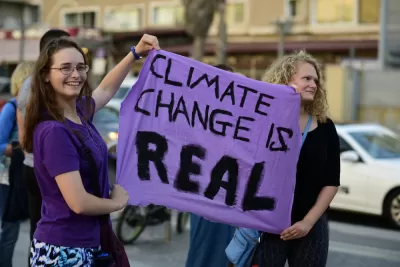If policymakers don't take clear, immediate action, emissions reductions will fall short of the 50-52 percent goal set in Paris.

In an analysis from Rhodium Group, authors John Larsen, Ben King, Emily Wimberger, Hannah Pitt, Hannah Kolus, Alfredo Rivera, Naveen Dasari, Claire Jahns, Kate Larsen, and Whitney Herndon combine their collective expertise "of the US economy, energy systems, and policy design with state-of-the-art modeling tools to comprehensively answer two questions: Can the US cut net GHG emissions by 50-52% by 2030 and if so, what does a policy pathway to the target look like?"
The report finds that "[u]nder current policy as of May 2021, with no new action, the US is on track to reduce GHG emissions 17-25% below 2005 levels in 2030." This "leaves a gap of 1.7-2.3 billion metric tons of emission reductions required to achieve the US target in 2030." The "analysis demonstrates that meeting the US’s 2030 target is achievable, if Congress, the executive branch, and subnational leaders all take a series of practical and feasible policy actions" that include "passage this year of the infrastructure bill and budget reconciliation package in Congress, coupled with a steady stream of standards and regulations by federal agencies and accelerated action by leading states and companies."
The report warns that "[e]ven then, achieving the ambitious goal puts the nation just halfway to the longer-term goal of net-zero emissions by mid-century, which is the level required for the US to play its role in a robust global response to the threat of climate change." The full report, which details "a series of actions that can be reasonably expected to occur over the next nine years if leaders in all levels of government work in earnest to address climate change," can be accessed here.
FULL STORY: Pathways to Paris: A Policy Assessment of the 2030 US Climate Target

Maui's Vacation Rental Debate Turns Ugly
Verbal attacks, misinformation campaigns and fistfights plague a high-stakes debate to convert thousands of vacation rentals into long-term housing.

Planetizen Federal Action Tracker
A weekly monitor of how Trump’s orders and actions are impacting planners and planning in America.

In Urban Planning, AI Prompting Could be the New Design Thinking
Creativity has long been key to great urban design. What if we see AI as our new creative partner?

How Trump's HUD Budget Proposal Would Harm Homelessness Response
Experts say the change to the HUD budget would make it more difficult to identify people who are homeless and connect them with services, and to prevent homelessness.

The Vast Potential of the Right-of-Way
One writer argues that the space between two building faces is the most important element of the built environment.

Florida Seniors Face Rising Homelessness Risk
High housing costs are pushing more seniors, many of them on a fixed income, into homelessness.
Urban Design for Planners 1: Software Tools
This six-course series explores essential urban design concepts using open source software and equips planners with the tools they need to participate fully in the urban design process.
Planning for Universal Design
Learn the tools for implementing Universal Design in planning regulations.
Gallatin County Department of Planning & Community Development
Heyer Gruel & Associates PA
JM Goldson LLC
City of Camden Redevelopment Agency
City of Astoria
Transportation Research & Education Center (TREC) at Portland State University
Jefferson Parish Government
Camden Redevelopment Agency
City of Claremont





























